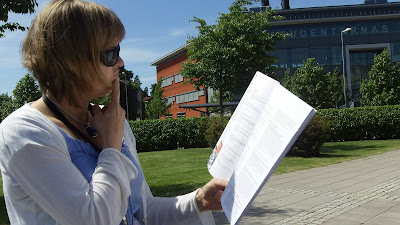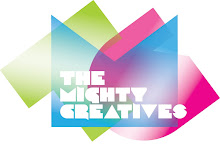Jemma:
Caroline and I recorded our final reflection thoughts on the week prior to the Gala Dinner on Thursday evening:
We'll be looking at what we've found out over the past week and working with the rest of the TMC team to make changes in the way we work.
Monday, 21 June 2010
Friday, 18 June 2010
Safely Landed
Both Jemma and I are back in Blighty, alive and well. A really busy, exciting, sociable and stimulating week! We are both tired but buzzing with new ideas that we're looking forward to sharing with you all back home. See you soon!
Thursday, 17 June 2010
Youth Moving Youth Policies Forward
The Global Youth Council have just been Skyping with a group of young people in Serbia to find out their issues with media to include in their final summary of their proposed declaration at tomorrow's closing ceremony.
The Global Youth Council have been Skpying with a group of young people in Nepal too.
The Global Youth Council have been Skpying with a group of young people in Nepal too.
Radijojo
Caroline:
Radijojo is a Berlin-based organisation that works across the globe in over 100 countries. They work mainly through partnership and using a range of social media platforms.
They categorise their content on their website by topic and geography. The themes are decided on by young people and people can send podcasts, recordings on mobiles etc. It can all be achieved with low-tech options, as they work in many developing countries who don't have access to high-tech equipment.
Radijojo doesn't have its own frequency but either airs work on the web or uses its network of Community radios across the world to broadcast the young people's contributions. These partnerships work well, as the community radios are happy to have the content that Radijojo provides. Their partnerships work on a social franchising model - in a not-for-profit context.
Radijojo has a set of formulas, standards and values that they ask others to sign up to and this could be anything from a school to a larger community organisation. They are exploring broadcasting straight to mobile phones to give them another outlet, but the technology isn't quite there yet.
They carry out workshops and projects in German schools and community settings. Often, they link up with other countries and exchange stories about their lives. The interaction with this personal content is key.
A separate project called "One Laptop One Child" delivered by an NGO aims to provide children in developing countries access to technology that can be made suitable for their needs e.g. dust proof laptops and solar charging. These kinds of projects are helping the kinds of link up programmes that Radijojo initiate.
The conversations between the young people in different countries can also lead to more direct action. Young people often suggest ideas for ways in which they can make each other's communities better. For example, a boy on a school council in Berlin, suggested that if the children that they were communicating with in Nigeria had access to a camera and a cutting tool that this would help them advocate for change in their communities. This was the beginning of something larger.
Young people send in reports about all kinds of issues, from a girl in Australia reporting about the bush fires to children in Gambia sharing the plight of farmers through desertification.
Another important aspect about Radijojo is the way they run their organisation. They train unemployed migrants and young people in Berlin who help them to do their work. In exchange, they give them references, relevant skills and confidence.
Some really great ideas here for personal exchanges, powerful story telling leading to action and innovative partnership work.
More later...
Radijojo is a Berlin-based organisation that works across the globe in over 100 countries. They work mainly through partnership and using a range of social media platforms.
They categorise their content on their website by topic and geography. The themes are decided on by young people and people can send podcasts, recordings on mobiles etc. It can all be achieved with low-tech options, as they work in many developing countries who don't have access to high-tech equipment.
Radijojo doesn't have its own frequency but either airs work on the web or uses its network of Community radios across the world to broadcast the young people's contributions. These partnerships work well, as the community radios are happy to have the content that Radijojo provides. Their partnerships work on a social franchising model - in a not-for-profit context.
Radijojo has a set of formulas, standards and values that they ask others to sign up to and this could be anything from a school to a larger community organisation. They are exploring broadcasting straight to mobile phones to give them another outlet, but the technology isn't quite there yet.
They carry out workshops and projects in German schools and community settings. Often, they link up with other countries and exchange stories about their lives. The interaction with this personal content is key.
A separate project called "One Laptop One Child" delivered by an NGO aims to provide children in developing countries access to technology that can be made suitable for their needs e.g. dust proof laptops and solar charging. These kinds of projects are helping the kinds of link up programmes that Radijojo initiate.
The conversations between the young people in different countries can also lead to more direct action. Young people often suggest ideas for ways in which they can make each other's communities better. For example, a boy on a school council in Berlin, suggested that if the children that they were communicating with in Nigeria had access to a camera and a cutting tool that this would help them advocate for change in their communities. This was the beginning of something larger.
Young people send in reports about all kinds of issues, from a girl in Australia reporting about the bush fires to children in Gambia sharing the plight of farmers through desertification.
Another important aspect about Radijojo is the way they run their organisation. They train unemployed migrants and young people in Berlin who help them to do their work. In exchange, they give them references, relevant skills and confidence.
Some really great ideas here for personal exchanges, powerful story telling leading to action and innovative partnership work.
More later...
Wednesday, 16 June 2010
Caroline's first day
As you saw from the video, my first session at the World Summit was about Kids News Network. To summarise in text, here is what they do:
- KNN are driven by two things: the desire to promote freedom of expression around the world and the Rights of the Child - to be informed.
- they provide a support structure to enable countries all over the world to set up their own news programme for young people. They help prepare the ground, train people, help make it sustainable, ensure good quality through qualitative research.
- It's about taking children and young people seriously, giving them a platform to give opinions about the news, shape the news and share the good news stories about young people.
- There's no "one size fits all" model for how they set up the programme. It can be commercial, funded or a combination of both. They have some funding from the Dutch government. It depends on the country, but it takes on average 2.5 years to set up.
Mostly they are working in difficult situations - in areas of great poverty, conflict etc. See the website for where they work.
- It doesn't always work. In Afghanistan or example, they started the programme full of hope, but the state broadcaster was taken over by religious fundamentalists. The women were fired. The editor in chief had to flee to India with her family. She is still there.
Another story stuck with me. In Burma, they have to broadcast underground, because of the Burmese regime.
The journalists are from Thailand and the children have to wear masks when they are on camera. But children's interests can be the same all over the world, no matter where they come from:
"I want to know everything about democracy, medicine and Manchester United". Burmese boy, aged 10.
- KNN are driven by two things: the desire to promote freedom of expression around the world and the Rights of the Child - to be informed.
- they provide a support structure to enable countries all over the world to set up their own news programme for young people. They help prepare the ground, train people, help make it sustainable, ensure good quality through qualitative research.
- It's about taking children and young people seriously, giving them a platform to give opinions about the news, shape the news and share the good news stories about young people.
- There's no "one size fits all" model for how they set up the programme. It can be commercial, funded or a combination of both. They have some funding from the Dutch government. It depends on the country, but it takes on average 2.5 years to set up.
Mostly they are working in difficult situations - in areas of great poverty, conflict etc. See the website for where they work.
- It doesn't always work. In Afghanistan or example, they started the programme full of hope, but the state broadcaster was taken over by religious fundamentalists. The women were fired. The editor in chief had to flee to India with her family. She is still there.
Another story stuck with me. In Burma, they have to broadcast underground, because of the Burmese regime.
The journalists are from Thailand and the children have to wear masks when they are on camera. But children's interests can be the same all over the world, no matter where they come from:
"I want to know everything about democracy, medicine and Manchester United". Burmese boy, aged 10.
Subscribe to:
Posts (Atom)


